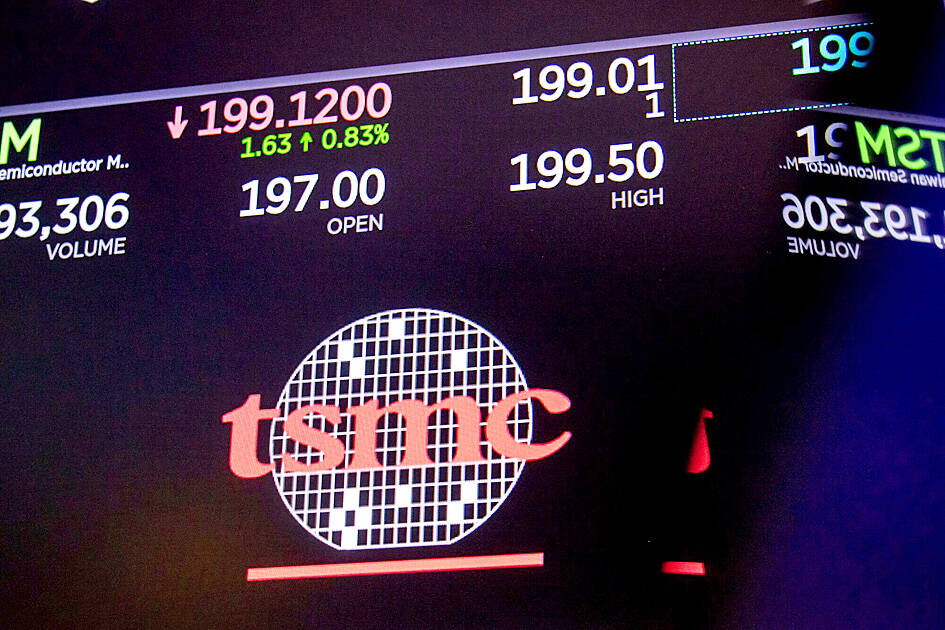Taiwan Semiconductor Manufacturing Co (TSMC, 台積電) shares yesterday closed at a new high in the wake of a rally among tech stocks on Wall Street on Friday, moving the TAIEX sharply higher by more than 600 points.
TSMC, the most heavily weighted stock in the TAIEX, rose 4.65 percent to close at a new high of NT$1,125, boosting its market value to NT$29.17 trillion (US$888 billion) and contributing about 400 points to the TAIEX’s rise.
The TAIEX ended up 639.41 points, or 2.79 percent, at 23,547.71. Turnover totaled NT$406.478 billion, Taiwan Stock Exchange data showed.

Photo: Bloomberg
The surge in TSMC follows a positive performance on Wall Street on Friday, with the Dow Jones Industrial Average rising 0.8 percent, the NASDAQ Composite index increasing 1.77 percent and the Philadelphia Semiconductor Index climbing 2.83 percent. TSMC’s American Depositary Receipts also posted a 3.49 percent rise.
TSMC and several electronics heavyweights attracted strong buying yesterday ahead of the opening of the Consumer Electronics Show (CES) in Las Vegas, analysts said.
“Many investors at home and abroad have highly anticipated Nvidia Corp will give positive leads at CES,” MasterLink Securities Corp (元富證券) analyst Tom Tang (湯忠謙) said, referring to a keynote speech Nvidia CEO Jensen Huang (黃仁勳) is to give at the tech event.
“So, after the strong showing among tech stocks on the US markets on Friday, large-cap electronics stocks in Taiwan just followed suit, led by TSMC,” Tang said.
Hon Hai Precision Industry Co (鴻海精密), assembly partner of Nvidia and Apple Inc, rallied 1.93 percent after the company reported better-than-expected revenue for the latest quarter and the whole of last year.
Elsewhere in Asia, markets were mixed yesterday, as traders struggled to track a healthy run-up on Wall Street, with minds turning to US president-elect Donald Trump’s second presidency.
Sydney, Singapore, Manila and Wellington edged up, while Seoul piled on 1.9 percent even as South Korea remains gripped by political uncertainty following suspended South Korean President Yoon Suk-yeol’s brief martial law attempt last month.
Tokyo retreated more than 1 percent, with Nippon Steel Corp taking a hit after US President Joe Biden blocked its proposed US$14.9 billion purchase of US Steel Corp, saying that it would “create risk for our national security and our critical supply chains.”
There were also losses in Hong Kong, Mumbai, Bangkok and Jakarta.
Meanwhile, Chinese stocks extended losses yesterday to three-month lows despite authorities’ efforts to shore up the market, as concerns over economic recovery and geopolitical tensions weighed.
The blue-chip CSI 300 closed down 0.2 percent to its lowest level since Sept. 27 last year, extending a 5.2 percent drop last week, while the Shanghai Composite index slipped 0.1 percent.
To stabilize volatility, the Shanghai and Shenzhen exchanges met with foreign institutions over the weekend, with both bourses pledging to continue opening up China’s capital markets and asking some large mutual funds to restrict selling.
Additional reporting by AFP and Reuters

Vincent Wei led fellow Singaporean farmers around an empty Malaysian plot, laying out plans for a greenhouse and rows of leafy vegetables. What he pitched was not just space for crops, but a lifeline for growers struggling to make ends meet in a city-state with high prices and little vacant land. The future agriculture hub is part of a joint special economic zone launched last year by the two neighbors, expected to cost US$123 million and produce 10,000 tonnes of fresh produce annually. It is attracting Singaporean farmers with promises of cheaper land, labor and energy just over the border.

US actor Matthew McConaughey has filed recordings of his image and voice with US patent authorities to protect them from unauthorized usage by artificial intelligence (AI) platforms, a representative said earlier this week. Several video clips and audio recordings were registered by the commercial arm of the Just Keep Livin’ Foundation, a non-profit created by the Oscar-winning actor and his wife, Camila, according to the US Patent and Trademark Office database. Many artists are increasingly concerned about the uncontrolled use of their image via generative AI since the rollout of ChatGPT and other AI-powered tools. Several US states have adopted

KEEPING UP: The acquisition of a cleanroom in Taiwan would enable Micron to increase production in a market where demand continues to outpace supply, a Micron official said Micron Technology Inc has signed a letter of intent to buy a fabrication site in Taiwan from Powerchip Semiconductor Manufacturing Corp (力積電) for US$1.8 billion to expand its production of memory chips. Micron would take control of the P5 site in Miaoli County’s Tongluo Township (銅鑼) and plans to ramp up DRAM production in phases after the transaction closes in the second quarter, the company said in a statement on Saturday. The acquisition includes an existing 12 inch fab cleanroom of 27,871m2 and would further position Micron to address growing global demand for memory solutions, the company said. Micron expects the transaction to

A proposed billionaires’ tax in California has ignited a political uproar in Silicon Valley, with tech titans threatening to leave the state while California Governor Gavin Newsom of the Democratic Party maneuvers to defeat a levy that he fears would lead to an exodus of wealth. A technology mecca, California has more billionaires than any other US state — a few hundred, by some estimates. About half its personal income tax revenue, a financial backbone in the nearly US$350 billion budget, comes from the top 1 percent of earners. A large healthcare union is attempting to place a proposal before